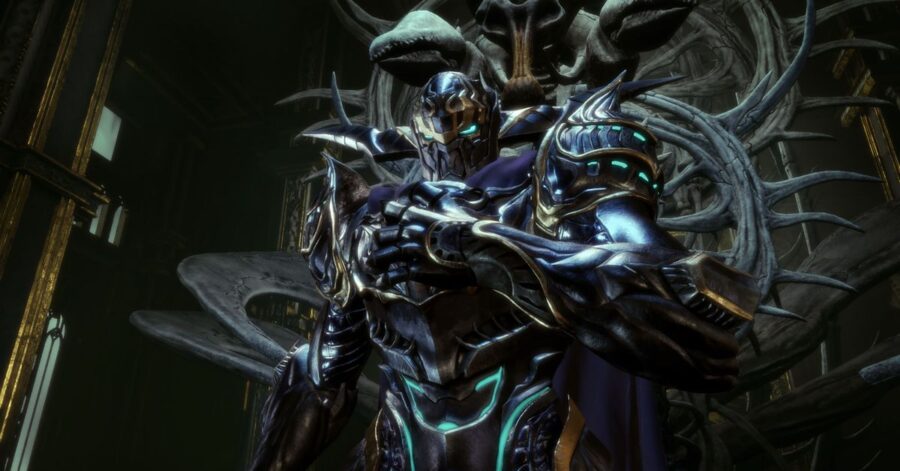Stranger of Paradise: Final Fantasy Origins rocketed into this world on fire. Square Enix’s chaos-filled E3 trailer instantly became a meme, and the accompanying demo launched in an unplayable state. Worse, the gameplay just looked dull.
But after actually playing the Stranger of Paradise demo, I’ve flipped my opinion. In fact, it only took one novel idea to elevate this Final Fantasy punchline to one of my most anticipated releases for 2024: the Soul Shield.
What is the Soul Shield?
Stranger of Paradise: Final Fantasy Origins plays like a Soulsborne game, which developer Team Ninja has plenty of experience with in Nioh. As Jack, you battle enemies in punishing, deliberate combat, barely making it from save point to save point. Its parry mechanic, the Soul Shield, has some unique properties.
When an enemy comes in for a hit, I can tap the circle button to raise my Soul Shield. Unlike Jack’s traditional block move, the Soul Shield drains his stagger bar while it’s active but it can catch almost any attack. It’s mostly a defensive move, letting me absorb damage and charge my magic bar, which in turn lets me cast powerful abilities. But Soul Shield is unique in how it interacts with my enemies’ special moves.
On the surface, it’s a nifty risk-versus-reward option. I’ll be extra vulnerable to my enemies if I abuse the shield, but not using the shield exposes me to damage.
As I played the Stranger of Paradise: Final Fantasy Origins PlayStation 5 demo, I saw how the Soul Shield takes this system one step further. Certain enemy moves have a purple hue around them during their cast time, signifying that my Soul Shield can do more than deflect; Soul Shield can steal the attack.
Why does Soul Shield make such a big difference?
When an enemy’s purple rock, fireball, or sound wave hits my Soul Shield, I don’t take any damage. Instead, I replicate the attack, contorting a defensive maneuver into an offensive thrust.
For example, Bomb enemies spew fire and explode if I move too close to them. But if I absorb their fire with Soul Shield, I can shoot bolts back at them to detonate them from a distance.
In the demo’s final battle against “Chaos?,” an armored knight, I have to use my Soul Shield to deflect sword attacks, generate my mana, and volley fireballs back at him. There’s a rhythm to the fight, all built around this one mechanic, making a tough battle feel, when done correctly, more like choreography.
Between stealing abilities and letting me survive nearly any attack, wielding the Soul Shield makes Stranger of Paradise feel like solving an efficiency puzzle. If I use it well, I can burn through a boss fight without getting hit, or take out an entire room full of enemies by catching a single fireball.
Trailers often over-promise their game’s features — think No Man’s Sky or Cyberpunk 2077 — but they can also undersell a game that plays well. You can’t show how satisfying it feels to dance with the devil in Stranger of Paradise’s final battle. You have to play a game before you can judge it, and Stranger of Paradise’s demo is a great reminder why.
Polygon – All
Source link
Related Post:
- Soul Land Reloaded, an officially licensed mobile game based on the original Soul Land story, has been released | Articles
- Playing The Ascent on Xbox Game Pass for PC makes me wish I was playing on Steam • Eurogamer.net
- Stranger of Paradise Final Fantasy Origin Outfits Hint at Possible Origins
- App Army Assemble: Rush Rally Origins – Is this new racer worth taking for a spin? | Articles
- Final Fantasy Pixel Remaster – Final Fantasy 1, 2, and 3 Release July 28th
- Final Fantasy Pixel Remaster series of Final Fantasy 1-3 will be released on July 28
- Final Fantasy Pixel Remaster is a collection of the first six Final Fantasy games, coming soon to iOS and Android | Articles
- Final Fantasy Pixel Remaster Announced, Includes Final Fantasy 1-6
- A Final Fantasy X-3 Story Is Already Written, But Final Fantasy 7 Remake Is The Main Priority
- FINAL FANTASY BRAVE EXVIUS x FINAL FANTASY VII REMAKE collab promises lots of free summons and event exclusives to win | Articles
